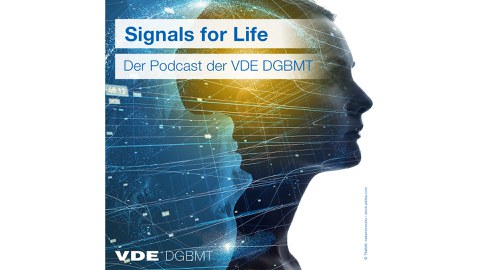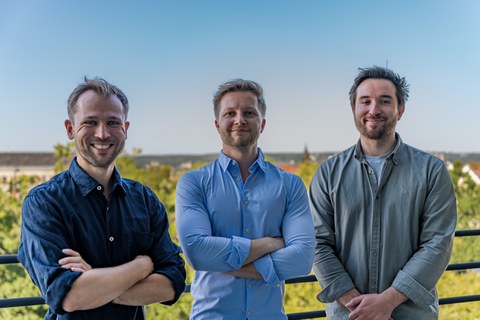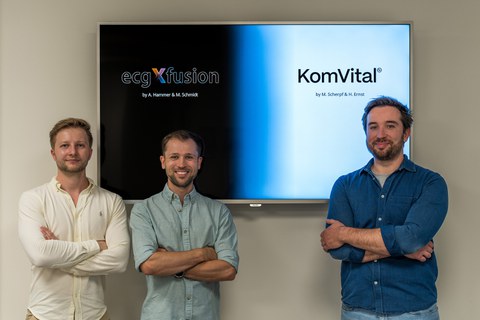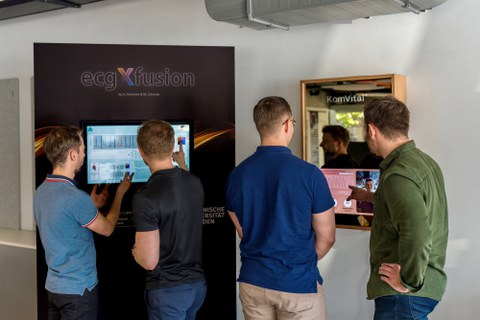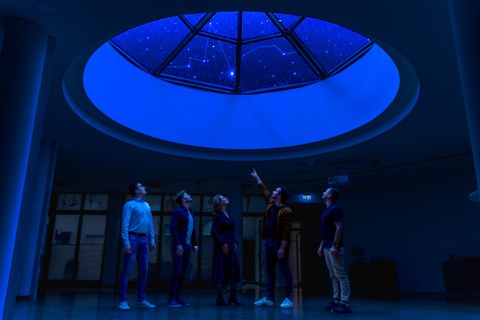Oct 22, 2024
Scientists from the Institute of Biomedical Engineering as guests on the podcast "Signals for Life"
Dr. Martin Schmidt and his colleagues Matthieu Scherpf and Alexander Hammer from TU Dresden were interviewed for the podcast of the German Society for Biomedical Engineering in the VDE "Signals for Life". The result is four episodes on the topics of doctorates, spin-off projects and science communication at the Institute of Biomedical Engineering (IBMT).
Podcast episode #49 KOMVITAL & ecgXfusion: Doctorate and what comes next? explores the question of how students actually decide to pursue a doctorate. Doctoral students Matthieu Scherpf and Alexander Hammer from the Biosignal Processing research group talk about their beginnings in research and take listeners on a journey into their doctoral topics. They address the questions of how topics emerge and what support you get as a doctoral student. Dr. Martin Schmidt, their supervisor, reports on the process and funding of a doctorate as well as the particular challenges of shaping the future.
In Episode # 50 KOMVITAL & ecgXfusion: Which paths lead to a spin-off? the two doctoral students present their spin-off projects KOMVITAL and ecgXfusion. In the KOMVITAL project, Matthieu Scherpf and his team are developing a clinically precise, camera-based measurement technology for autonomous health monitoring in the home environment that is suitable for everyday use. Alexander Hammer and his team are working on ecgXfusion: a revolutionary ECG-based diagnostic support system that enables doctors to diagnose cardiovascular diseases reliably and non-invasively. The audience will gain insights into the planning phase, learn how to write a business plan and be informed about regulations that apply to founders. In addition, various options for support and funding will be presented.
In episode #51 of "Signals for Life" Science communication: When technical language suddenly no longer works, researchers talk about science communication and how important it is to communicate science to the general public. They talk about their enthusiasm and motivation for science communication, present offers of help and address challenges such as fake news and lack of time.
#52 Science communication: COSMO and the Night of Biosignals is dedicated to two very current examples of science communication in Dresden: the Night of Biosignals and the COSMO Science Forum. Both events create interfaces between research and society.
About the events:
On November 15, 2024, the "Night of Biosignals" will take place simultaneously in various German cities from 6 p.m. to midnight. The Institute of Biomedical Engineering is opening its doors to the interested public for this event. In six exciting presentations, scientists will take the audience into the world of biosignals. They will provide insights into the complex signals of our body and their applications in medical research, diagnostics and therapy.
As part of the exhibition "Dr. Zukunft - Medizintechnik aus der Dresdner Wissenschaft", scientists from Dresden's research institutions will present their current projects. Interactive exhibits provide insights into current developments in medical technology. Dr. Martin Schmidt's Biosignal Processing working group will also be presenting two exhibits. The exhibition can be visited until February 28, 2025 at the COSMO Science Forum, Schloßstr. 2 in Dresden.
To the podcast "Signals for Life":
https://www.vde.com/de/dgbmt/publikationen/dgbmt-podcasts
All podcast episodes are also available on Spotify:
https://open.spotify.com/show/1KgjeD7PN8PMcGXwoBuPWh
Contact:
Dr.-Ing. Martin Schmidt
Institute of Biomedical Engineering
Group Leader Biosignal Processing
Phone: +49 351 463 39942
E-mail: martin.schmidt@tu-dresden.de
https://biosig.eu

